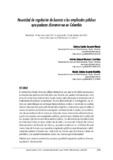The Need for Regulation on Leaves of Absence for Public Employees Suffering from Dysmenorrhea in Colombia
Necesidad de regulación de licencia a las empleadas públicas que padecen dismenorrea en Colombia;
Necessidade da regulação da licença às funcionárias públicas que padecem dismenorreia na Colômbia

View/
Share this
Date
2022-10-25Author
Ascanio Rincón, Andrea Camila
Márquez Castillejo, Andrés Samuel
Ascanio Mantilla, Nataly Juliana
Citación
Metadata
Show full item recordDocuments PDF
Abstract
The purpose of this article is to determine why public employees in Colombia should be granted a leave of absence for dysmenorrhea, due to the recognition of women as subjects of special protection in the Colombian legal system. For the development of the research, a methodology with a legal hermeneutic approach was used through a theoretical-documental analysis, applying the exegetical and systematic method to study the Colombian normative framework that regulates the protection of women and the conditions for granting work leaves as administrative situations, which are proper to public employees in this country. Through the analysis of the norms in force in the legal system, the jurisprudential decisions in Colombia on the subject under study and the case of the Court of Administrative Justice of the State of Mexico, it is possible to demonstrate the viability of this new type of leave for those public employees who medically prove that they suffer from dysmenorrhea, indicating also that this leave must be periodic and cannot be understood as a sick leave. El presente artículo tiene por objeto determinar por qué se les debe reconocer a las empleadas públicas en Colombia una licencia por padecer dismenorrea, esto en razón al reconocimiento de la mujer como sujeto de especial protección en el ordenamiento jurídico colombiano. Para el desarrollo de la investigación, se utilizó una metodología con enfoque hermenéutico jurídico a través de un análisis teórico-documental, aplicando el método exegético y sistemático para estudiar el marco normativo colombiano que regula la protección de la mujer y las condiciones de procedencia de las licencias laborales como situaciones administrativas, que le son propias a los empleados públicos en este país. Mediante el análisis de las normas vigentes en el ordenamiento jurídico, las decisiones jurisprudenciales en Colombia sobre el tema objeto de estudio y el caso del Tribunal de Justicia Administrativa del Estado de México, permiten evidenciar la viabilidad de este nuevo tipo de licencia para aquellas empleadas públicas que demuestren médicamente padecer dismenorrea, indicando así mismo que esta licencia debe ser periódica y no puede entenderse como una licencia por enfermedad. O presente artigo tem por objetivo determinar por que se deve reconhecer as funcionárias públicas na Colômbia uma licença por padecer dismenorreia, isto em razão ao reconhecimento da mulher como sujeito de especial proteção no ordenamento jurídico colombiano. Para o desenvolvimento dessa pesquisa, utilizou-se uma metodologia com enfoque hermenêutico jurídico através de uma análise teórico-documental, aplicando o método exegético e sistemático para estudar o marco normativo colombiano que regula a proteção da mulher e as condições de procedência das licenças trabalhistas como situações administrativas, que são próprias dos funcionários públicos nesse país. Ao analisar as normas vigentes no ordenamento jurídico, as decisões jurisprudenciais na Colômbia sobre o tema objeto de estudo e o caso do Tribunal de Justiça Administrativa do Estado do México, permitem pôr em evidência a viabilidade desse novo tipo de autorização para as funcionárias públicas que mostrem medicamente sofrer dismenorreia, indicando assim que essa licença deve ser periódica e não pode ser entendida como um atestado de doença.
